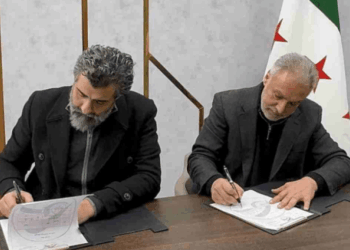The recent overthrow of the Assad regime in Syria has created a geopolitical inflection point that presents both significant opportunities and complex challenges for US policy. The emergence of a new government in Damascus that appears hostile to Iran initially aligns with long-standing US objectives. However, current approaches by both the US and Israel risk undermining this potential advantage. This analysis examines how US interests in eliminating Russian and Iranian influence in Syria intersect with sanctions policy and Israel’s security concerns, highlighting the risk that continued hostility could inadvertently push the new Syrian government back into the arms of US adversaries.
The Geopolitical Significance of Assad’s Fall
The December 2024 collapse of Bashar al-Assad’s government marks a seismic shift in Middle Eastern power dynamics, dismantling a key component of Iran’s regional influence network. Assad’s fall represents a significant blow to Iran, Israel’s main regional enemy, and weakens Tehran’s “Axis of Resistance” that had been built to exert indirect pressure on Israel through allied groups. This development has potentially disrupted one of the main logistical channels through which Iran supplies its regional allies with weapons and military support.
Before this regime change, the Iran-Russia-Syria alignment had been steadily strengthening for years. The Syrian civil war saw Iran and Russia coordinate effectively to prevent Assad’s fall, and significantly increase both countries’ geopolitical, diplomatic, and military footprint in the region. More recently, these powers established a “coordination center” specifically designed to expel US forces from Syria. The Syrian territory had become a critical component of Iran’s regional strategy, serving as a land bridge for delivering weapons to Hezbollah and other proxies.
The new interim government under Ahmad al-Sharaa, composed of elements previously opposed to Assad, appears to share the US interest in limiting Iranian influence. However, this alignment of interests is precarious and could be undermined by current US and Israeli approaches.
The Sanctions Dilemma: Leverage Versus Recovery
The United States currently maintains extensive sanctions on Syria through the Caesar Act, which were designed to pressure the Assad regime. With that regime now gone, there is growing debate about whether these measures should remain in place. US Senator Jim Risch, chairman of the Senate Foreign Relations Committee, has proposed “a gradual lifting of the Caesar sanctions” contingent on how the new interim government acts. This approach recognizes that sanctions initially targeted Assad and his regime, which no longer exists.
The consequences of maintaining sanctions are potentially counterproductive to US interests. Syria faces colossal reconstruction costs and ongoing humanitarian difficulties, with widespread poverty and food insecurity exacerbated by years of conflict. This economic vulnerability creates precisely the type of vacuum that Iran and Russia have historically exploited to expand their influence, offering financial and material support in exchange for strategic advantages.
The Trump administration’s National Security Council is reportedly developing a new Syria policy, with Senator Risch emphasizing the need for quick action. The proposed approach would make sanctions relief conditional on the interim government’s commitment to governance that respects human rights and religious diversity, ensures Syria doesn’t become a launching pad for terror attacks, and eliminates chemical weapon stockpiles.
Israel’s Aggressive Posture and Its Implications
Israel’s response to Assad’s fall has been notably aggressive. In the two days following the regime change, Israel reportedly carried out nearly 500 airstrikes, destroying much of the Syrian military’s weaponry and stockpiles. Beyond these air operations, Israel has sent ground forces deeper into Syrian territory, establishing nine outposts in villages within the demilitarized buffer zone created by the 1974 disengagement agreement.
This approach represents a significant departure from Israel’s previous relationship with Syria. While Assad was viewed as an enemy, there was a functioning modus vivendi – “the border with Israel was quiet even at the height of the civil war in Syria.” Now, Israeli officials appear to view the new government with even greater suspicion, despite its apparent hostility toward Iran. Senior Israeli officials have indicated that “Israel’s presence there is indefinite” and declared an intention to establish a wider “demilitarized” zone stretching across southern Syria.
Israel’s stance may be driven by security concerns. Even with Assad gone, the country fears that a stronger Syrian government could eventually turn hostile. Yet paradoxically, Israeli officials also worry that the new Syrian authorities will be incapable of prevailing over jihadist and pro-Iranian groups, suggesting a potentially contradictory assessment of the situation.
The Risk of Unintended Consequences
The current approach by both the US (through maintaining sanctions) and Israel (through military pressure) risks creating precisely the outcome they seek to avoid – pushing Syria back toward Russia and Iran. Therefore, if Israel does not modify its approach to post-Assad Syria, it might risks turning a state that seems ready for accommodation into an adversary.
Even though the new Syrian government has stated it does not seek confrontation with Israel, it has also warned that Israel “no longer has any reason to continue bombing in Syria now that Iran is no longer an active presence in the country.” This statement could be interpreted as an implicit warning that continued Israeli aggression could change Syria’s calculus.
For a fragile new government struggling to consolidate power and rebuild a devastated country, pragmatic alliances may become necessary for survival, regardless of ideological differences. If faced with continued economic strangulation through sanctions and military pressure from Israel, Syria’s leadership may conclude that rapprochement with Russia and Iran is their only viable option.
Russia, with its long-standing interest in maintaining influence in Syria, would likely welcome such an opportunity. However, despite maintaining close cooperation with Tehran since the 1990s, Russia has avoided building long-term and binding alliance arrangements with Iran. Instead, Moscow has utilized its relations with Iran as a bargaining chip vis-à-vis the US. This suggests Russia might leverage the current situation to strengthen its position vis-à-vis the United States.
Balancing Security Concerns with Strategic Opportunities
The evidence suggests that the US and its allies face a delicate balancing act in Syria. Maintaining maximum pressure through sanctions and military operations may satisfy short-term security concerns but risks undermining long-term strategic interests by driving Syria back into alignment with US adversaries.
A more nuanced approach would involve gradual sanction relief tied to specific behaviors, as Senator Risch has suggested. This could provide the new Syrian government with economic breathing room while maintaining incentives for continued cooperation on security issues. For Israel, moderating its military posture while maintaining vigilance might better serve its long-term interests than the current approach of buffer zone expansion and extensive military operations.
Conclusion
The fall of the Assad regime presents a rare strategic opportunity for the United States to reduce Iranian and Russian influence in Syria. However, capitalizing on this opportunity requires thoughtful policy adjustments, particularly regarding sanctions and support for aggressive Israeli actions.
As one analysis aptly puts it, “Rather than opposing sanctions relief for Syria, Israel may better serve its interests by encouraging the U.S. to be more proactive and specific in articulating the benchmarks Syria should meet.” This approach recognizes that the US retains significant leverage over Damascus through influence over international reconstruction funding, as well as the ability to remove – and, if it sees fit, to reinstate – terrorist designations.
The history of sanctions suggests they often have unintended consequences, sometimes reshaping the world against US interests. In Syria’s case, maintaining blanket sanctions risks creating the very outcome they were designed to prevent – a Syria aligned with US adversaries. A more calibrated approach that encourages positive behavior through conditional sanction relief offers a better path toward achieving US strategic objectives in Syria and the broader Middle East.






